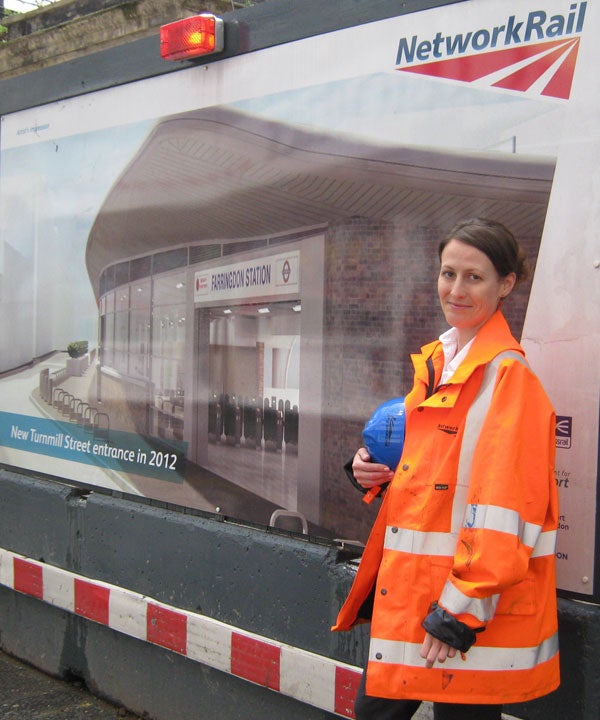I Want Your Job: Engineer
Heather McPherson, 31, works for Network Rail as a project manager at Farringdon Station in London

What do you actually do?
I'm in charge of delivering a brand new two-storey station entrance and concourse, as well as upgrading the existing building at Farringdon Station in London. This is part of the £5.5bn Thameslink programme to double capacity on the core railway route through central London, with more frequent and longer trains and improved stations. We get around 50,000 passengers a day and it becomes very busy in the mornings and evenings. A new entrance will help ease congestion. I liaise with the designers to make sure they're designing what we've asked for, deal with contractors, and meet with stakeholders – there are a lot of them.
Describe your typical day
I usually get to the office, which is next to the station, at 8am and begin by checking emails and going over reports from the previous evening. Mine is a day job, but I need to know what's gone on overnight. If something hasn't been completed on time, I have to ask why. My day is mostly taken up with meetings, such as trying to solve long-term design issues, although I try to get out once a week to do inspections. There's a big difference between working on a project like this and working on a new building or bridge, because the station has to be kept operating at all times and everything has to be safe. I finish meetings around 4pm and spend a couple of hours catching up on emails. I usually finish work at 6.30pm and the last thing I do is write briefing notes to update people. It sounds boring, but we come across lots of issues in such an old railway station, and my job is to discover these problems and find a solution. I talk to very clever, experienced people all day long and I have to squeeze that information into a half-page briefing.
Do you like the job?
I like being involved in something that makes a difference to the people who use it and I love working in construction and seeing the physical result of hard work. Every day is a school day; I'm constantly learning and I like to be challenged. For me, it's fascinating. I couldn't stand doing a job I would find boring, even if I was paid far more.
What's the hardest part?
Technically, it's very difficult keeping a station open while a major civil engineering work is going on. It can also be difficult making sure that stakeholders' requirements are met. The station was built in the 1860s and has Grade 2 listed status, so there's a lot of liaising with English Heritage, but it is owned by London Underground. English Heritage might want certain materials to be used on the station's façade, but this might not comply with London Underground standards. There's a lot of compromise and negotiation.
What skills do you need?
You need leadership skills to be able to work well with people and to form relationships. I'm from Australia and I had to make some adjustments at first. I was straight down the line when I started and the British are more reserved so I've had to adjust a bit. You need to be able to delegate, to co-ordinate people with different skills and to draw everything together. It can be a high-pressure environment and you need to stay positive, because people turn to you when it looks like something might suddenly go horribly wrong.
How did you get the job?
I did a Bachelor degree in engineering in Australia and then worked for P&O Ports as a project manager. When I came to Britain, I wanted a career change; I wanted to give something back to the community and to be involved in a major construction project.
What's your advice for people who want your job?
Go to university. Network Rail has a graduate scheme and many applicants have done the Masters in project management, a Network Rail course run with University College London and the University of Warwick. We have had two people from this scheme join us last year. They've done very well and are about to be promoted.
What's the salary like?
A Network Rail project manager in London can earn £45,000 to £57,500 a year.
What's the career path?
I could go on to projects with greater scope, or become a senior project manager, which is a more strategic role. But right now I'm happy with my job and I can't wait to see the finished station.
For more information on how to apply for the Network Rail graduate scheme, visit careers.networkrail.co.uk/graduates
Join our commenting forum
Join thought-provoking conversations, follow other Independent readers and see their replies
Comments
Bookmark popover
Removed from bookmarks